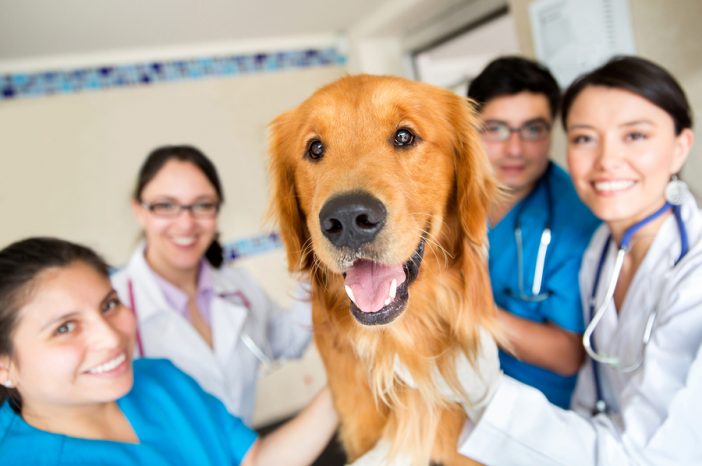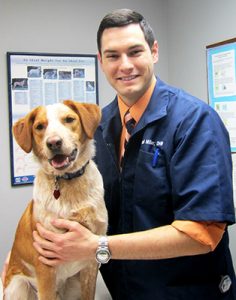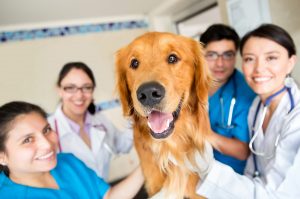

My dad was a coach. I spent countless hours by his side as I was growing up, first as the water boy and then as a player. Until recently, I didn’t understand how the lessons he taught me through years of sports have directly affected my professional life.
After retiring from a long career in education, my dad found an opportunity to coach an after school youth basketball league for elementary school students. On my rare (very rare) Saturday off, I was able to witness the out-of-retirement coach in action. It was like a precious peek into my personal psychological development. The more I watched, the more I thought about how the lessons taught through sports at that early age have made me a better person, a better leader, and a better veterinarian.
I could fill a book with all the lessons from that youth basketball game that directly relate to veterinary medicine, but there was one lesson that really stood out to me. Whenever someone made a basket, my dad made sure that kid acknowledged the teammate who passed him the ball – either with a quick word of thanks or more often a fist bump (because apparently the cool kids don’t give high fives anymore). By the end of the game, the kids were fist bumping after scoring without any prompt from the coach. He looked so proud.
A Simple But Vital Action
That may seem like a very random point to focus on, but think about that for a minute from an animal behavior perspective. The kid with the assist received positive reinforcement for passing the ball, so he’s more likely to pass the ball again. Also, consider the team building angle: that simple interaction laid a foundation for a cooperative team dynamic that is so important to maintain in a group working toward a common goal.
Veterinary medicine is a team sport. We do not succeed alone. More importantly, we must acknowledge our team members who are vital to our success.
 I thought I was good at this, but I learned that I sometimes make mistakes with how I acknowledge my team’s efforts at work. Gratitude is not one size fits all. I currently work at multiple locations, and the teams at each location have their own personalities. One team is food motivated, so they are easy to please with sweets. Another team includes a bunch of members on intense work-out and diet plans. Instead of a box of donuts being a treat, they were actually upset I was ruining their diets. Fail. Air ball. I have since learned that a bouquet of fragrant flowers for the break room was much more appreciated by that team.
I thought I was good at this, but I learned that I sometimes make mistakes with how I acknowledge my team’s efforts at work. Gratitude is not one size fits all. I currently work at multiple locations, and the teams at each location have their own personalities. One team is food motivated, so they are easy to please with sweets. Another team includes a bunch of members on intense work-out and diet plans. Instead of a box of donuts being a treat, they were actually upset I was ruining their diets. Fail. Air ball. I have since learned that a bouquet of fragrant flowers for the break room was much more appreciated by that team.
(Side note: Hint to the men out there – women love flowers! It doesn’t make any sense to us guys. Flowers are expensive, you can’t eat them, and they just wilt and die. We’ll never understand it, and I don’t think we’re supposed to. Just give the girls flowers.)
Two Little Words
Finally, don’t underestimate the power of a simple verbal “thank you”. I once walked into a hospital after hours to find several of the staff still there because they were finishing treatments on an emergency patient. As I passed through, I quickly thanked them for staying late to care for the patient. Later one of the technicians told me that was the first time in weeks anyone had thanked her for her work, and she was very grateful for my comment. That simple acknowledgement of appreciation was more important to her than I could have realized at the time.
Did you thank your team today? Now, I try to remember to tell my staff “Thank you for your help today” before I leave each night. Apparently it’s working, and some team members are learning from my example. This week as I was leaving work I overheard a technician tell the new employee who just started, “Thank you for your help today.” I suddenly understood how my dad felt when those little basketball players started fist bumping on their own. Watching my team come together through the power of appreciation made me feel so proud.
 ABOUT THE AUTHOR
ABOUT THE AUTHOR
Dr. Michael W. Miller, DVM is a part-owner of a four hospital practice and splits time between Lakewood Animal Hospital and Pine Bluff Animal Hospital in Morris, Illinois. He has a special interest in exotic animal medicine – especially reptiles, but he also enjoys working on dogs and cats including his mischievous shelter mutt named Wombat.